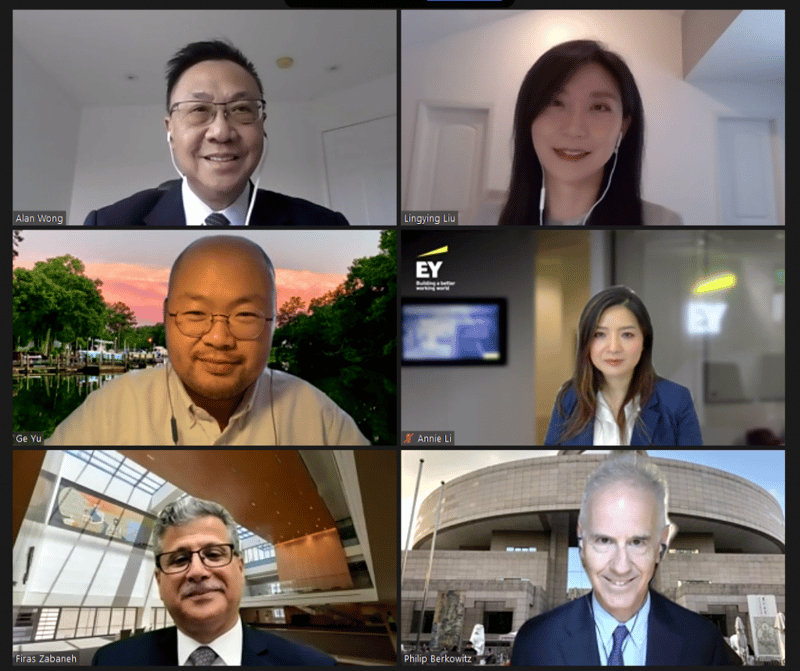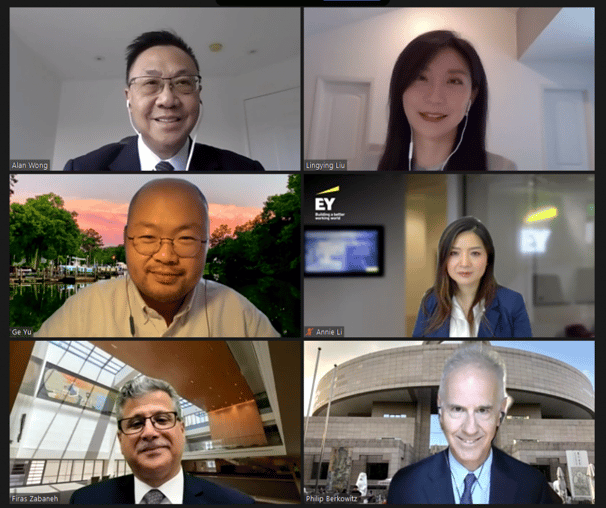
On June 9th, 2021, CGCC-USA along with CGCC D.C. and CGCC Houston hosted a webinar titled "Vaccination and Office Reopening: Facts and Tips."
As the Centers for Disease Control and Prevention issues new guidelines for fully vaccinated individuals, more businesses have been considering how to safely reopen offices. The webinar brought together over 165 participants from across the country to hear from a diverse panel of professionals on topics surrounding reopening the workplace and vaccination.

Moderated by Ge Yu, Executive Director of CGCC–DC and Lingyi Liu, Executive Director of CGCC–Houston, the webinar’s distinguished panel included:
- Firas R. Zabaneh—MT(ASCP), CIC, CIE, MBA Director, System Infection Prevention & Control Houston Methodist System Quality & Patient Safety
- Philip Berkowitz—CGCC Legal Counsel Committee Member, Shareholder, Littler
- Alan Wong—MD & Head of Human Resources Department, Bank of China
- Annie Li—Executive Director of People Advisory Services, Ernst & Young
CGCC-USA, CGCC-Houston, and CGCC-Washington-D.C. extend great appreciation to all the panelists and participants.
CLICK HERE for EY’s “Work Reimagined Employee Survey 2021” Key Findings sharing during the event. To view the full report kindly email Annie.Li@ey.com
Q&As from our audience and distinguished speakers can be found below:
Question 1: CDC messaging is confusing for a lot of people and sometimes conveyed by media as politically driven. What is your advice in terms of getting people comfortable going forward with CDC guidance?
Firas R. Zabaneh: I would suggest obtaining the guidelines directly from the CDC website instead of relying on the media to provide interpretation and commentary. Just keep in mind that due to the unpredictable nature of pandemics guidelines may change frequently. As more information becomes available, the CDC and other guiding organizations, modify recommendations to align with emerging science. In addition, the CDC often publishes general information regardless of conditions related to the pandemic in different regions. There are multiple factors individuals must assess before making major changes to the prevention measures they follow. These factors include regional public health mandates and recommendations, current conditions related to the pandemic in your locality (threat levels and vaccination levels), your vaccination status, your level of comfort for discontinuing prevention measures (i.e. masking, social distancing, etc.), state of your health, and health of others around you.
Question 2: I heard from the news that vaccine effectiveness lasts only six months. does it mean that I have to get the vaccine again after six months?
Firas R. Zabaneh: There is currently no definitive information related to how long immunity from the vaccine will last. Some experts suggest that immunity may last far longer than predicted, but others suggest that a booster vaccine may be warranted on an annual basis. What we currently know is that both Pfizer and Moderna are studying booster vaccines and we anticipate that reliable information will be available in the next few months related to the longevity of vaccine effectiveness. Stay tuned!
Question 3: Please confirm that "all" business employers can require the vaccination of employees. My understanding is that there is controversy for example that in professional services, IF the employees have been able to work remotely, then the employer does NOT have the right to "require".
Philip Berkowitz: The federal Equal Employment Opportunity Commission (EEOC) recently revised its vaccination guidelines. These guidelines confirm that the federal EEO laws do not prevent an employer from requiring all employees physically entering the workplace to be vaccinated for COVID-19.
However, there are some exceptions and other considerations of which employers need to be aware.
- If an employee objects to receiving a vaccine because of a disability or for a sincerely held religious belief, then the employer must consider and possibly permit an exemption as a reasonable accommodation, unless doing so would present an undue hardship to the employer.
- Potential reasonable accommodations could include requiring the employee to wear a mask, work a staggered shift, making changes in the work environment (such as improving ventilation systems or limiting contact with other employees and non-employees ), permitting telework if feasible, or reassigning the employee to a vacant position in a different workspace.
- The law generally permits employers to test whether such a disability or sincerely held religious belief exists. For example, if an employee requests a religious accommodation, and an employer is aware of facts that provide an objective basis for questioning either the religious nature or the sincerity of a particular belief, practice, or observance, the employer would be justified in requesting additional supporting information. But this can be quite delicate and tricky, and you should consult counsel in the event of receiving such a request.
- If an employee cannot get vaccinated for COVID-19 because of a disability or sincerely held religious belief, practice, or observance, and there is no reasonable accommodation possible, then the employer can lawfully exclude the employee from the workplace. This does not mean the employer may automatically terminate the worker. Again, the employer would need to consider whether there is a reasonable accommodation available that would be short of termination.
- As a best practice, an employer introducing a COVID-19 vaccination policy and requiring documentation or other confirmation of vaccination should notify all employees that the employer will consider requests for reasonable accommodation based on disability or religious belief on an individualized basis.
- As a best practice, before instituting a mandatory vaccination policy, employers should provide managers, supervisors, and those responsible for implementing the policy with clear information about how to handle accommodation requests related to the policy.
- Employers and employees typically engage in a flexible, interactive process to identify workplace accommodation options that do not impose an undue hardship (significant difficulty or expense) on the employer. This process may include determining whether it is necessary to obtain supporting medical documentation about the employee’s disability.
Other important considerations:
- The Americans with Disabilities Act (ADA) requires an employer to maintain the confidentiality of employee medical information, such as documentation or other confirmation of COVID-19 vaccination. This ADA confidentiality requirement applies regardless of where the employee gets the vaccination. Although the EEO laws themselves do not prevent employers from requiring employees to bring in documentation or other confirmation of vaccination, this information, like all medical information, must be kept confidential and stored separately from the employee’s personnel files under the ADA.
- An employer may offer an incentive to employees to voluntarily provide documentation or other confirmation that they received a vaccination on their own from a pharmacy, public health department, or other health care provider in the community).
*The information provided in the webinar and the subsequent news releases does not represent the official opinion of the organizations involved and does not constitute official health, legal or financial advice.
DISCLAIMER:The resource collected and provided on this page does not constitute advice in any way whatsoever. Any action you take upon the information on this page is strictly at your own risk, and we will not be liable for any losses or damages in connection with the use of the resources on this list.
CGCC accepts no responsibility for and excludes all liability in connection with browsing these resources, use of the information, or downloading of any materials, including but not limited to any liability for errors, inaccuracies, omissions, or misleading or defamatory statements.
The content and information on this page might be changed or updated periodically without notice.